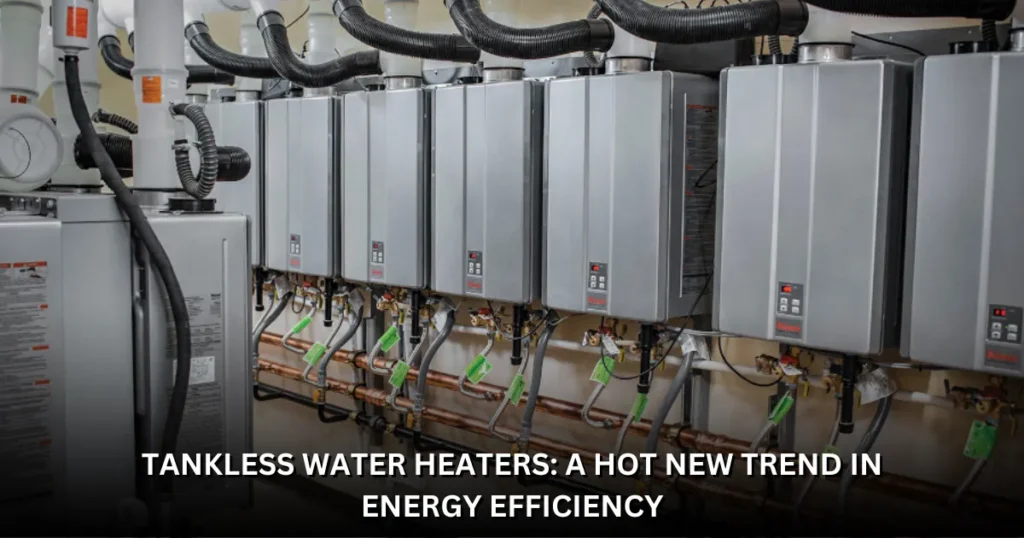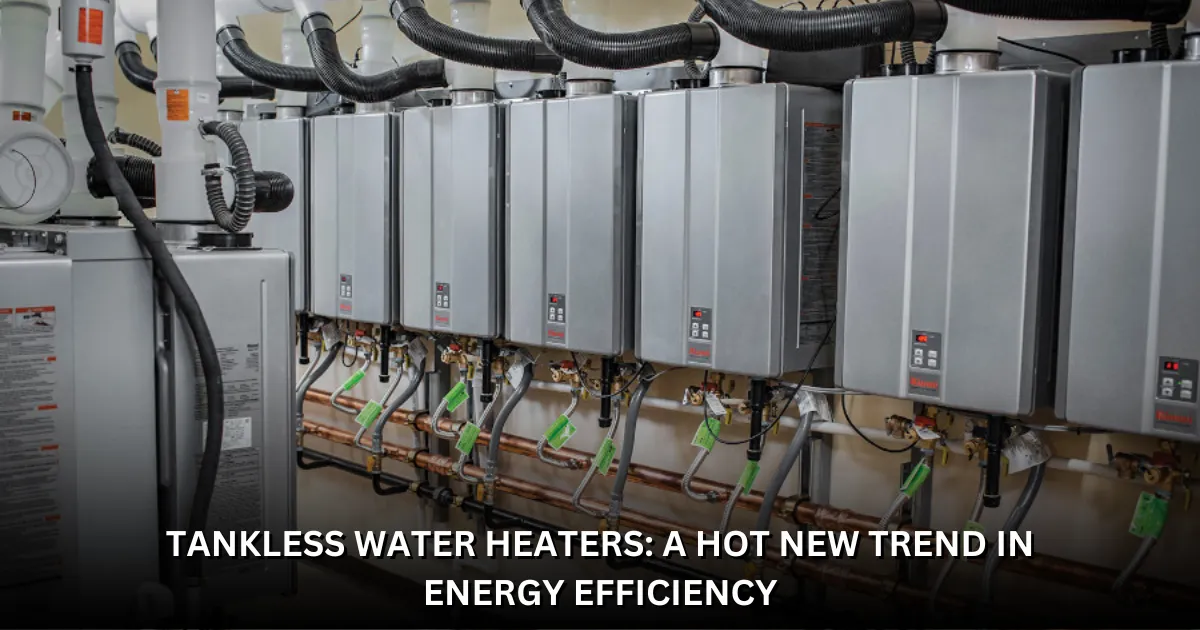
Tankless Water Heaters: A Hot New Trend in Energy Efficiency
As homeowners increasingly prioritize energy efficiency and cost savings, tankless water heaters have emerged as a leading choice in modern home appliances. These innovative devices, which heat water on demand rather than storing it, offer numerous benefits that can significantly enhance your home’s energy profile while delivering a virtually endless supply of hot water. In this comprehensive guide, we delve into the key aspects of tankless water heaters, from their basic operation to the nuances of choosing, installing, and maintaining them.
What is a Tankless Water Heater?
A tankless water heater, also known as an on-demand or instant water heater, is a compact unit designed to heat water only when it is needed. Unlike traditional water heaters that store a large volume of hot water in a tank, a tankless system heats water directly as it flows through the unit. This process is triggered when a hot water tap is turned on, sending cold water through a heat exchanger that is powered by either gas or electricity.
How Do Tankless Water Heaters Work?
Cold water enters the tankless unit when you turn on the hot water tap.. Inside, a flow sensor detects the water’s movement and activates the heating element or gas burner. The water is then rapidly heated as it passes through the heat exchanger, delivering hot water directly to the faucet or appliance without the delay associated with tank-style heaters.
Types of Tankless Water Heaters
There are two main types of tankless water heaters: electric and gas-powered.
- Electric tankless water heaters are typically smaller and easier to install, making them a popular choice for point-of-use applications or smaller households. They rely on electrical resistance coils to heat the water.
- Gas-powered tankless water heaters use a gas burner to heat the water and are generally more powerful, capable of providing hot water for multiple fixtures simultaneously. They require proper venting and a steady supply of gas, making installation more complex.
Benefits of Tankless Water Heaters
Switching to a tankless water heater can bring several significant advantages to your home, from reducing energy consumption to enhancing comfort and convenience.
Energy Efficiency and Cost Savings
The exceptional energy efficiency of a tankless water heater is among the strongest arguments in favor of using one. Traditional water heaters keep a large tank of water hot at all times, resulting in standby heat loss—energy wasted in maintaining the water temperature when it’s not being used. In contrast, a tankless water heater only heats water when needed, which can reduce energy consumption by up to 30% compared to conventional models.
This efficiency translates directly into cost savings. Tankless units are generally more expensive up front, but over time, the savings on energy costs can cover the expense. Additionally, many regions offer rebates or incentives for installing energy-efficient appliances, further enhancing the financial appeal of going tankless.
Unlimited Hot Water Supply
With a tankless water heater, you’ll never have to worry about running out of hot water. Traditional tanks can be depleted during periods of high demand, leaving you waiting for the water to reheat. Tankless systems, however, provide continuous hot water for as long as the tap is open, making them ideal for large families or homes with multiple bathrooms.
Space-Saving Design
Tankless water heaters are significantly smaller than their tanked counterparts, freeing up valuable space in your home. These compact units can be mounted on a wall, inside a closet, or even in a small utility space. This makes them an excellent choice for homes with limited space or for those looking to reclaim space currently occupied by a bulky water heater tank.
Longer Lifespan and Durability
Tankless water heaters are built to last, with a typical lifespan of 20 years or more, compared to 10-15 years for traditional tank heaters. The absence of a tank also means there’s no risk of tank leaks or the associated water damage, further enhancing the durability and reliability of these units.
How Much Does a Tankless Water Heater Cost?
The cost of a tankless water heater can vary widely depending on several factors, including the unit’s size, energy source, and installation complexity.
Upfront Costs
On average, a gas-powered tankless water heater costs between $1,000 and $2,500, while an electric model typically ranges from $500 to $1,500. These prices are higher than traditional tank water heaters, but the investment is often justified by the long-term savings on energy bills.
Installation Costs
Installation costs can also vary, with gas units generally requiring more complex and costly installation due to the need for proper venting and gas line connections. Electric units are usually easier and cheaper to install, especially if the existing electrical system can handle the load. On average, installation costs range from $500 to $1,500, depending on the unit’s requirements and the existing infrastructure in your home.
Operating Costs
While the initial investment is higher, the operating costs of a tankless water heater are lower due to the reduced energy consumption. Over the lifetime of the unit, these savings can be substantial, especially in households with high hot water usage.
Choosing the Right Tankless Water Heater
Selecting the right tankless water heater for your home involves considering several factors, including your household’s hot water demands, the type of energy available, and your budget.
Determining Your Hot Water Needs
The first step is to assess your household’s hot water needs. Consider the number of people in your home and the frequency with which hot water is used. For instance, if multiple showers, laundry loads, and dishwashers are running simultaneously, you’ll need a unit with a higher flow rate, measured in gallons per minute (GPM).
Electric vs. Gas
Deciding between an electric and gas tankless water heater depends on your home’s existing infrastructure and energy costs. Gas units are typically more powerful and better suited for larger homes, while electric models are easier to install and may be more cost-effective for smaller households or point-of-use applications.
Consideration of Climate
If you live in a colder climate, you may need a more powerful unit, as the incoming water temperature is lower and requires more energy to heat. In such cases, a gas-powered unit might be more efficient and cost-effective.
Installation and Maintenance
Proper installation and maintenance are key to ensuring your tankless water heater operates efficiently and lasts for years.
Professional Installation
While it’s possible to install a tankless water heater yourself, professional installation is recommended to ensure the unit is set up correctly and safely. This is especially important for gas units, which require precise venting and gas line connections. A qualified plumber or HVAC technician can ensure the installation meets local building codes and manufacturer specifications.
Routine Maintenance
Although tankless water heaters require less maintenance than traditional tank models, regular upkeep is still important. The most critical maintenance task is flushing the unit annually to remove mineral buildup, especially in areas with hard water. This prevents scale from reducing the unit’s efficiency and extends its lifespan.
Conclusion
Tankless water heaters offer a modern, energy-efficient alternative to traditional water heating systems. With their ability to provide endless hot water, reduce energy consumption, and save space, they are an excellent investment for homeowners looking to enhance their home’s comfort and efficiency. By understanding the different types of tankless water heaters, evaluating your hot water needs, and ensuring proper installation and maintenance, you can enjoy the benefits of this innovative technology for years to come.

